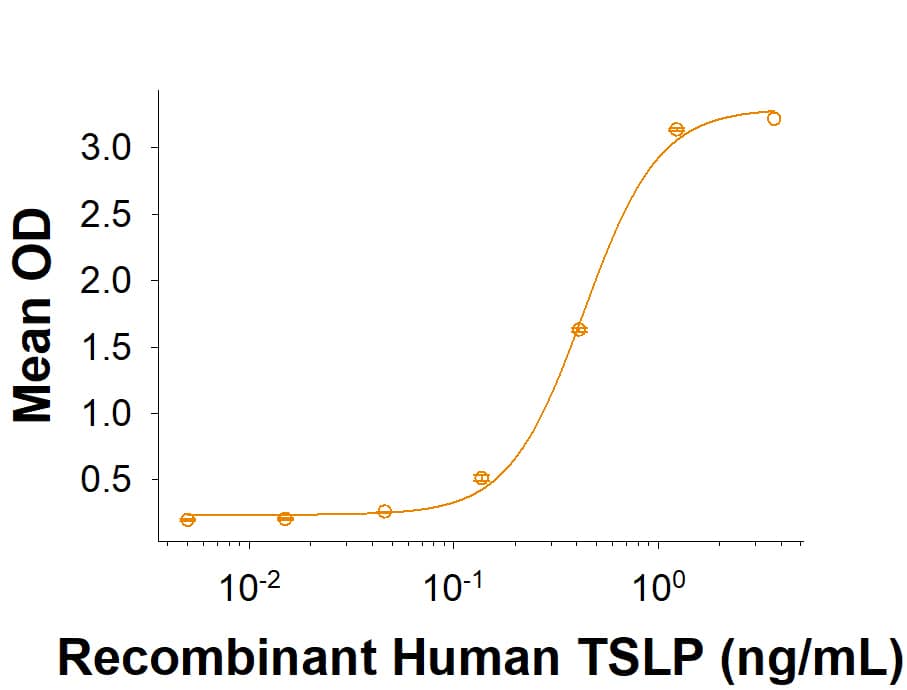Recombinant Human TSLPR His-tag Protein, CF
R&D Systems, part of Bio-Techne | Catalog # 10963-TR

Key Product Details
Product Specifications
Source
Gln23-Lys231, with a C-terminal 6-His tag
Purity
Endotoxin Level
N-terminal Sequence Analysis
Gln23 inferred from enzymatic pyroglutamate treatment revealing Gly24
Predicted Molecular Mass
25 kDa
SDS-PAGE
Activity
When Recombinant Human TSLPR His-tag is immobilized at 1.00 μg/mL (100 μL/well), Recombinant Human TSLP (Catalog # 1398-TS) binds with an ED50 of 0.200-1.20 ng/mL.
Scientific Data Images for Recombinant Human TSLPR His-tag Protein, CF
Recombinant Human TSLPR His-tag Protein Binding Activity.
When Recombinant Human TSLP R His-tag (Catalog # 10963-TR) is immobilized at 1.00 μg/mL (100 μL/well), Recombinant Human TSLP (1398-TS) binds with an ED50 of 0.200-1.20 ng/mL.Recombinant Human TSLPR His-tag Protein SDS-PAGE.
2 μg/lane of Recombinant Human TSLPR His-tag Protein (Catalog # 10963-TR) was resolved with SDS-PAGE under reducing (R) and non-reducing (NR) conditions and visualized by Coomassie® Blue staining, showing bands at 37-47 kDa.Formulation, Preparation and Storage
10963-TR
| Formulation | Lyophilized from a 0.2 μm filtered solution in PBS with Trehalose. |
| Reconstitution | Reconstitute at 500 μg/mL in PBS. |
| Shipping | The product is shipped at ambient temperature. Upon receipt, store it immediately at the temperature recommended below. |
| Stability & Storage | Use a manual defrost freezer and avoid repeated freeze-thaw cycles.
|
Background: TSLPR
Thymic stromal lymphopoietin receptor (TSLPR), also known cytokine receptor-like module 2 (CRLM-2) and IL-XR, is a member of the type 1 cytokine receptor family. TSLPR has been identified most closely related to the common gamma chain ( gammac) and, when complexed with interleukin 7 receptor alpha (IL-7R alpha), forms a high affinity complex for the IL-7-like cytokine TSLP (1-4). The extracellular domain (ECD) of human TSLPR contains two fibronectin type III-like domains and a WSXWS‑like motif, which is necessary for proper protein folding (1-4). The cytoplasmic domain contains a membrane-proximal box 1 motif that is important for association with JAKs (2, 3). The ECD of Human TSLPR shares 34% amino acid sequence identity with the ECD of mouse TSLPR. An alternatively spliced mRNA variant encoding a soluble TSLPR has also been reported in mouse (5). In the signaling pathway of TSLP-TSLPR, which is similar to that of IL-7, TSLP activates the transcription factor signal transducer and activator of transcription 3 (STAT3), inducing the expression of common genes (4). TSLPR expression is ubiquitous in the immune and hematopoietic cells but is up-regulated in Th2-skewed cells (3, 4). Elevated expression of TSLP-TSLPR in bronchial mucosa has been associated with human asthma by acting as a susceptibility factor to generate Th2 allergic responses to antigens (4, 6). TSLP also is involved in Th2-mediated allergic skin inflammation by inducing Th2 cytokine secretion by T cells during the effector phase of allergic skin inflammation (4, 7). TSLP has been shown to induce the release of T cell-attracting chemokines from monocytes and enhance the maturation of CD11c+ dendritic cells (DC) (4). TSLP activated human DCs are also involved in the homeostatic proliferation of naïve and memory T cells in the absence of foreign antigens (4).
References
- Park L.S. et al. (2000) J. Exp. Med. 192:659.
- Blagoev, B. et al. (2002) Gene. 284:161.
- Ziegler, S.F. et al. (2013) Advances in Pharmacology. 66:129.
- He, R. et al. (2010) Ann N Y Acad Sci. 1183:13.
- Hiroyama, T. et al. (2000) Biochem. Biophys. Res. Commun. 272:224.
- Headley, M.B. et al. (2009) J Imunol. 182:1641.
- Soumelis, V. et al. (2002) Nat Immunol. 3:673.
Long Name
Alternate Names
Gene Symbol
UniProt
Additional TSLPR Products
Product Documents for Recombinant Human TSLPR His-tag Protein, CF
Product Specific Notices for Recombinant Human TSLPR His-tag Protein, CF
For research use only

